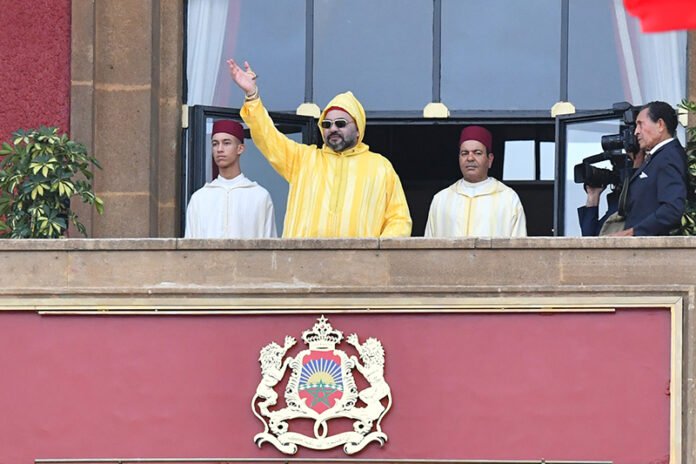Introduction: An Unprecedented Historical Step
In an unprecedented move, the Moroccan state, under the direct guidance of His Majesty King Mohammed VI, issued a decision aimed at purifying the political landscape from widespread corruption. According to this decision, anyone wishing to run for elections must obtain a certificate of approval from three key institutions: the Ministry of the Interior, the General Directorate of National Security, and the Public Prosecution.
This certificate is granted only to those with no convictions or prosecutions for corruption, abuse of power, or embezzlement of public funds—a measure described by observers as the “fatal blow to political corruption” in Morocco.
The goal is clear: restore trust between citizens and institutions and establish a political climate based on competence and electoral programs rather than illicit money or narrow loyalties.
Moroccans Abroad: Constitution Guarantees Rights, Reality Restricts
Article 17 of the 2011 Constitution stipulates that Moroccans residing abroad enjoy full citizenship rights, including the right to vote and stand in local, regional, and national elections. However, practical implementation remains distant from reality.
Despite recent government initiatives, political participation of Moroccans abroad remains limited, as they are required to join electoral lists determined by political parties rather than freely choose their representatives.
Government Initiatives: A Partial Step Toward Facilitation
In preparation for the 2026 legislative elections, Interior Minister Abdelouafi Laftit announced measures to facilitate participation of Moroccans abroad:
-
Encouraging political parties to include diaspora candidates in their electoral lists.
-
Providing financial incentives to parties supporting this participation.
-
Allowing voting from abroad via polling stations in Morocco or specialized agencies in host countries.
Despite these efforts, representation remains limited and indirect, as expatriates cannot freely choose their parties or candidates.
Practical Challenges to Real Participation
Moroccans abroad face several obstacles:
-
Wide geographic distribution: Moroccans in over 100 countries make organizing elections complex.
-
Limited diplomatic representation: Some countries lack full consular services, complicating voting.
-
Electoral logistics: issues in dividing districts, voting methods, and ensuring validity of results abroad.
-
Lack of civil society involvement: active associations in Europe are not consulted, limiting representation and leaving decisions to officially supported parties.
Digital Solutions: Opening Paths for Free Participation
Journalist and writer Jamal El Sosi, president of the World League of Moroccans Abroad, proposed an innovative solution: electronic voting apps.
This app allows Moroccans abroad in France, Belgium, the Netherlands, or Spain to vote or run as candidates, provided they have a smartphone. This simple yet revolutionary idea gives the diaspora direct choice of their representatives, bypassing traditional party constraints while benefiting from advanced technological capabilities in host countries.
Issues of Political Control and Protection
The key question: why does the Ministry of the Interior not allow the diaspora to freely choose their representatives?
-
Control and domination: the government fears free voting could introduce uncontrolled political figures, disrupting electoral balance.
-
Traditional methods: decades-long practice imposes party nominations, linking financial support to diaspora representation, maintaining a “selection system.”
-
Fear of dispersion: Moroccan presence in over 100 countries justifies centralized control of election results.
Analytical Reading
-
Rights perspective: denying Moroccans abroad freedom of choice violates full citizenship principles.
-
Practical perspective: Moroccan diaspora in Europe has organizational and technical expertise for transparent elections via digital apps.
-
Political perspective: controlling nominations reflects government concern over losing diaspora representation control, causing frustration among expatriates.
Key Questions
-
Will the state grant Moroccans abroad the freedom to choose representatives?
-
Can digital voting replace traditional participation effectively?
-
How to balance government oversight with democratic freedom of choice?
-
Can parties adapt to these changes or will imposed nominations persist?
Conclusion
Purifying Morocco’s political landscape is historic, but insufficient without giving Moroccans abroad real space to make political decisions themselves. Election reform success now depends not only on combating corruption but also on restoring diaspora trust and granting full freedom to express their will through modern and effective tools.
Graph: Distribution of Moroccans Abroad by Continent and Main Country
| Country/Region | Approx. Number |
|---|---|
| France | 1,250,000 |
| Spain | 880,000 |
| Belgium | 700,000 |
| Netherlands | 419,000 |
| Italy | 487,000 |
| Germany | 300,000 |
| USA | 350,000 |
| Canada | 120,000 |
| Gulf Countries | 200,000 |
| Other Asian Countries | 100,000 |
| South America | 50,000 |
| Africa (excluding Morocco) | 200,000 |
Total estimate: approx. 4,056,000 Moroccans abroad
According to the 2024 report by the Economic, Social, and Environmental Council, 89% of Moroccan migrants live in Europe (4.5 million), with the rest spread across 100+ countries.


